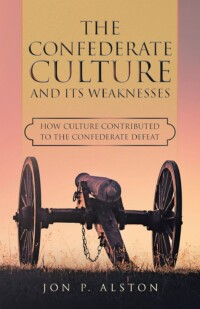Title: The Confederate Culture and Its Weaknesses
Subtitle: How Culture Contributed to the Confederate Defeat
Author: Jon P. Alston
Publisher: iUniverse
ISBN: 978-1-6632-5150-3
Pages: 330
Genre: Historical / Non-fiction
Reviewed by: Reshita Midya
Pacific Book Review
Jon P. Alston’s work, The Confederate Culture and Its Weaknesses, is a historical non-fiction which offers an in-depth exploration of how the cultural stigma of the South led to the end of the Confederates.
Southern culture had elements that hindered their success in a pre-modern war, as Southern Cavaliers often prioritized personal ambitions and the pursuit of honor and popularity. Jon P. Alston’s contemplative book reflects upon these nuances in the politics of the South that led to the fall of the Confederate.
Alston’s book commences with a thought-provoking question: Could the Southern states of America have avoided or emerged victorious in the Civil War? His theories and analyses draw from official post-war documents and the subsequent discourse that unfolded. The author thoughtfully examines socio-political terms such as “culture” and “norms” to dissect the societal structure of the South and its profound impact on politics. Southern culture, with its array of missteps in military, financial, economic, ideological, personal, and political realms, ultimately sealed the Confederacy’s fate.
The book delves into the stark differences between the North and the South. Alston keenly observes one of the primary cultural distinctions between the two regions was the South’s heavy reliance on the practice of slavery, which had substantial social and economic ramifications. The South’s emphasis on agricultural land over industrialization led to a primarily agrarian society ill-equipped to effectively support the military and its soldiers. Alston references many historians, such as James M. McPherson and William Howard Russell, further to enunciate the issue with the South’s cultural stature. Apart from simply showing what the South lacked, the book also speaks of the strengths of the North that were compatible with the contemporary world of that time.
A striking feature of the book is the reverence with which the author has made his observations, and yet at the same time maintained unbiased retrospection. Alston adopts a storytelling approach, skilfully presenting facts and figures in a narrative style that captivates the reader. The book’s true brilliance lies in its ability to convey historical events and insights with clarity and transparency, eschewing any attempts to sugarcoat or distort history. Alston used easy and straightforward language, making this a highly engaging and informative read.
The Confederate Culture and Its Weaknesses is an engaging and dynamic read which takes the reader back centuries. From war strategy to the North and South cultural stature, the book covers many topics of the Civil War. But most importantly, it is a constructive criticism in the most unbiased way of the setbacks of the South. Readers who enjoy historical facts, theories, argumentative essays, and non-fiction would enjoy this book.


